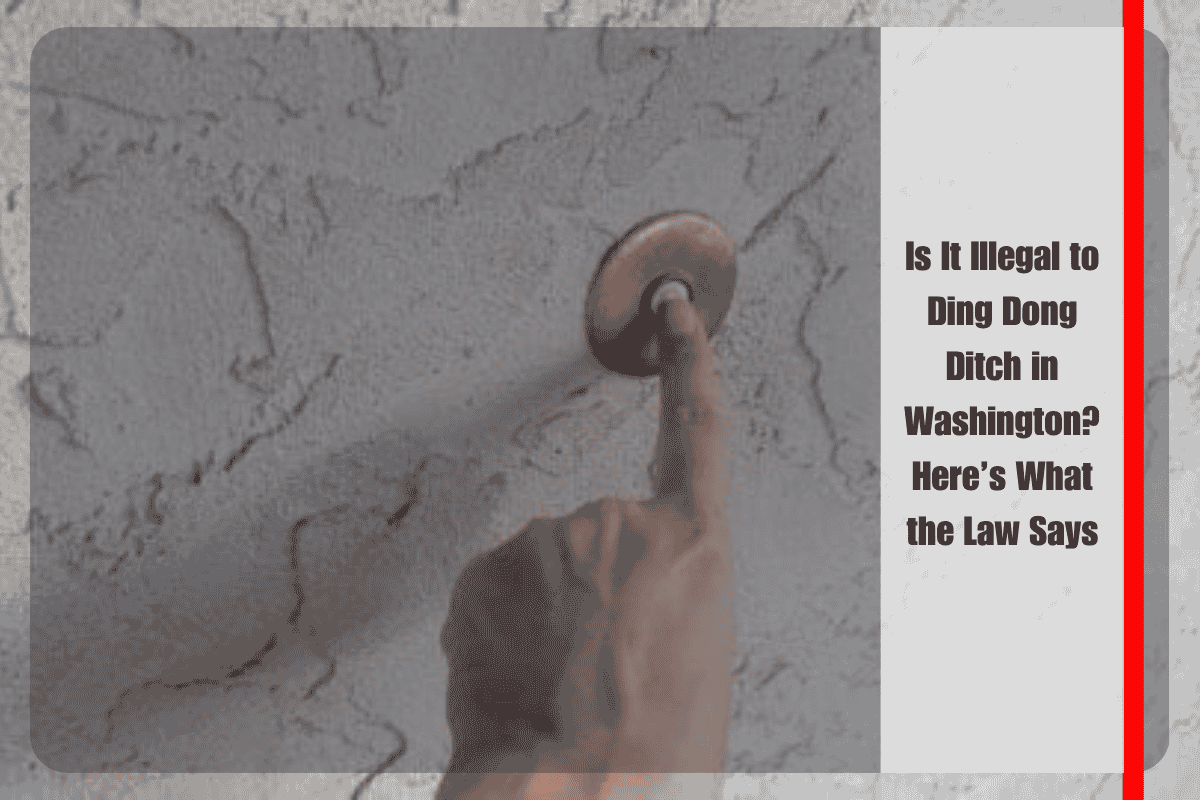“Ding Dong Ditch,” a classic childhood prank where someone rings a doorbell and then runs away before the homeowner can answer, may seem harmless and fun at first. However, in Washington State, this prank can quickly cross the line into illegal behavior depending on the circumstances. Here’s a breakdown of the laws surrounding Ding Dong Ditch in Washington and why it could get you into trouble.
What Is Ding Dong Ditch?
“Ding Dong Ditch” is when a person rings or knocks on someone’s door, then runs away before the homeowner can open the door. It is typically done for fun, but it can create significant annoyance, confusion, and sometimes even fear, especially when it’s done repeatedly or in the middle of the night.
While this act may appear to be innocent and playful, it can quickly escalate into more serious legal issues, especially if the person performing the prank is not respecting the privacy and peace of the homeowner.
Laws That Apply to Ding Dong Ditch in Washington
While there are no specific laws that directly address Ding Dong Ditch, several existing laws in Washington can be applied to this act, making it potentially illegal.
1. Harassment and Reckless Behavior
In Washington, harassment is defined as any act that causes substantial emotional distress to another person. If someone repeatedly rings or knocks on a person’s door with the intent to cause annoyance or distress, this could potentially be considered harassment. According to Washington State’s harassment statute (RCW 9A.46.020), harassment is a crime if it involves actions that cause emotional distress or are intended to disturb the peace of another person.
Even if the act seems innocent at first, if it’s done repeatedly or at night, it could be considered harassment. Washington law also considers reckless behavior to be a criminal act, which could apply if the prank is done in a way that causes harm or distress to the person answering the door.
2. Trespassing
Another law that might apply is trespassing. Trespassing occurs when someone enters or remains on another person’s property without permission. While Ding Dong Ditch typically doesn’t involve entering someone’s home or property, it may still involve stepping onto private property without consent, especially if it’s done repeatedly or in a manner that causes alarm.
In Washington, trespassing laws can be applied if a person is on private property without permission and refuses to leave when asked, or if their actions cause inconvenience or distress to the property owner. This could apply if the prankster repeatedly approaches the door and disturbs the residents.
3. Vandalism or Destruction of Property
If, during the prank, any damage is done to the property — whether it’s the doorbell or front porch — vandalism laws may be triggered. Vandalism in Washington involves damaging, defacing, or destroying someone’s property intentionally. If the prankster causes any damage, they could be charged with vandalism.
4. Disturbing the Peace
While Washington does not have a specific law about Ding Dong Ditch, the state does have a “disturbing the peace” law (RCW 9A.84.030), which makes it illegal to create unreasonable noise or engage in disruptive behavior. If a prankster rings the doorbell late at night or repeatedly disturbs the household, they could be charged with disturbing the peace if the prank creates a significant nuisance.
Potential Consequences of Ding Dong Ditch
While Ding Dong Ditch might seem like a harmless prank, it can result in serious consequences under Washington law. Depending on the nature of the prank and how it impacts the homeowner, the prankster could face fines, community service, or even criminal charges such as harassment, trespassing, or disturbing the peace. For instance:
Harassment charges can carry criminal penalties, including jail time and fines.
Trespassing charges can result in fines and potentially a criminal record.
If property is damaged during the prank, charges for vandalism could lead to expensive fines or even jail time.
When Does Ding Dong Ditch Cross the Line?
The key factor in determining whether Ding Dong Ditch is illegal is intent and frequency. If the act is done once or twice, and it doesn’t cause harm, it might be considered a harmless prank. However, if the prank is done repeatedly, causes distress to the homeowner, or involves illegal actions like trespassing or property damage, it could quickly escalate into a legal issue.
Additionally, time of day matters. If the prank is done at night or during early morning hours, it can cause significant disturbance. Repeated disruptions could also qualify as harassment or disturbing the peace, resulting in serious legal consequences.
In Washington, while Ding Dong Ditch might appear innocent, it can quickly become a criminal offense depending on the circumstances. It’s important to consider the impact of the prank on others and understand the potential for legal trouble. Pranks that involve disturbing the peace, trespassing, or causing harm to property can result in criminal charges and fines. As a general rule, it’s best to avoid pranks that might disrupt others’ lives and respect their privacy and peace.
Sources
[1] https://collincountymagazine.com/2025/07/18/is-it-illegal-to-ding-dong-ditch-in-washington-heres-what-the-law-says/
[2] https://keyw.com/ding-dong-ditching-a-prank-or-a-crime-in-washington-state/
[3] https://www.pumphreylawfirm.com/blog/is-ding-dong-ditching-as-harmless-as-pranksters-think/
[4] https://www.legalreach.com/blog/is-ding-dong-ditching-illegal-it%E2%80%99s-more-serious-than-you-might-think
[5] https://www.avvo.com/legal-answers/is-ding-dong-ditching-illegal-in-wa-state–4100473.html












